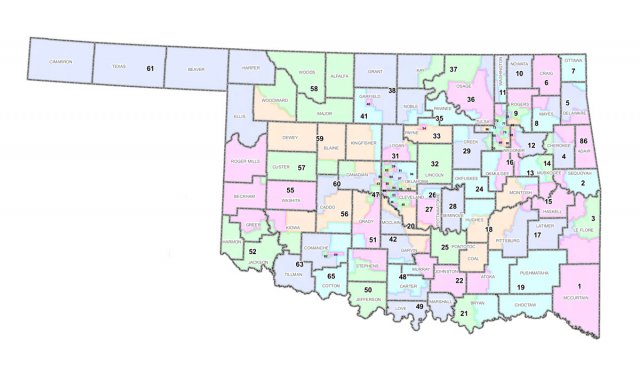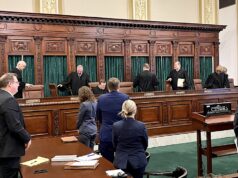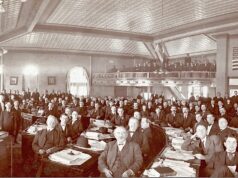
A new group called People Not Politicians is spearheading a ballot initiative to create an independent commission for redistricting legislative and congressional seats in Oklahoma. Filed this afternoon with Oklahoma Secretary of State Michael Rogers’ office, the proposed redistricting ballot initiative would change the Oklahoma Constitution and will need about 178,000 signatures to make a 2020 ballot.
Supporters will have 90 days to gather signatures once all potential challenges to the petition language are addressed.
“This is a complicated solution to a simple problem,” People Not Politicians executive director Andy Moore said Monday. “The simple problem is gerrymandering, and the complicated solution is creating multiple firewalls to prevent the influence of partisan politics from corrupting the redistricting process.”
In recent years, Moore founded and lead the nonpartisan civic engagement group Let’s Fix This. In pushing a redistricting ballot initiative, Moore sees plenty that needs fixing.
“The way the system is now, it allows politicians to draw their own districts and, in effect, pick their own voters. That’s an election in reverse,” Moore said. “We elect them, but when it comes to the redistricting process, they are the ones picking their own voters. That’s not fair, it’s not right.”
Legislative and congressional districts are reapportioned every 10 years following the U.S. Census. Currently, the Legislature must complete its apportionment decisions within 90 days after the start of the first regular session following the Census.
In early October, Senate President Pro Tempore Greg Treat (R-OKC) named Sen. Lonnie Paxton (R-Tuttle) and Sen. Dave Rader (R-Tulsa) to the Senate’s redistricting committee. Treat also announced the hiring of Keith Beall, former chief of staff for Lt. Gov. Todd Lamb who also managed Lamb’s 2018 gubernatorial campaign, as Senate redistricting director.
In September, House Speaker Charles McCall (R-Atoka) announced the House would create its redistricting committee in early 2020 and had already formed an email address to give the public say over what he called a “citizen-driven” process.
Moore said the proposed redistricting ballot initiative filed today would be more transparent.
“When politicians are more focused on getting re-elected and when they have districts that ensure they get re-elected regardless of how they perform, then politicians are not accountable to voters the way they should be,” Moore said. “And they maybe neglect doing what is in the best interest of the state.”
‘Commission-drawn maps usually have more confidence from the public’
Also supported by Oklahoma’s chapter of the League of Women Voters, the proposed redistricting ballot initiative would create a nine-member independent commission and a three-member panel of retired judges.
The panel would accept applications for redistricting commissioners, selecting two members from each of the top two political parties in the state and two members from citizens unaffiliated with those parties. Then those six commissioners would select one additional commissioner from each of the three groups to form the nine-member commission.
“By making politicians more accountable to voters, this proposal will force them to actually start focusing on finding solutions to the problems facing Oklahoma, like our struggling schools, our crumbling roads and closing hospitals,” Jan Largent, president of the League of Women Voters of Oklahoma, said in a press release. “Oklahomans deserve to have fair and equal representation across the state, and partisan gerrymandering is keeping that from happening. This initiative will create more competitive elections, which will force politicians to be responsive to the needs of average citizens and start fixing many of the state’s real problems.”
OU political science professor Keith Gaddie has written extensively on the topic of redistricting and has offered court testimony in 17 states where redistricting plans faced scrutiny. While Gaddie said Monday he is “out of the game,” he spoke generally about the type of commission proposed by People Not Politicians.
“When it comes to redistricting, you get a political map that is responsive to changes in public opinion when a commission or a court draws it,” Gaddie said. “When you let legislatures do it without any other check on them, you often get highly partisan maps that have bias for the majority party. Commission-drawn maps usually have more confidence from the public.”
Proponents of the redistricting ballot initiative say Oklahomans need not look further than the current State Senate map for evidence that partisan redistricting practices yield unreasonable legislative districts. Senate District 45 resembles a game of Tetris, looping from northwest Mustang down through north Moore and back up to the edge of Del City. Senate District 30 winds through northwest Oklahoma County to form the outline of a laboratory microscope.
Moore lives in SD 30 and laughed at its design.
“Part of it is only continuous because it includes the road around Lake Hefner,” he said. “It includes all of the lake, but there are no houses there.”
Moore also pointed to House District 41, which runs from far northwest Oklahoma City up to the rural area of Garfield County northwest of Enid one hour and 40 minutes away.
“The problem is that you force voters who live in different areas of the state and who may have very different concerns to rely on the same legislator to represent both of their interests,” Moore said. “It’s a very disparate system.”
Gaddie, who has been contracted by both Oklahoma Democrats and Oklahoma Republicans for past redistricting efforts, noted that federal rules govern much of the intricacy of how congressional and legislative maps must be drawn, with states having more flexibility on the latter.
In general, those requirements — such as ensuring equal opportunity for minority representation — need to be met regardless of whether the Legislature or a commission handles redistricting, Gaddie said.
He also emphasized that an independent redistricting commission would not end up giving Democrats undue influence in a state like Oklahoma.
“There’s no way in hell you’re ever going to get a Democratic legislative map in this state right now because it’s not a Democratic state,” Gaddie said. “It’s not that you want a map that is 50/50, you want a map that is reflective of changes in public opinion.”
McCall responds: ‘Petition is a solution in search of a problem’
McCall, the House speaker, issued a statement panning Monday’s redistricting ballot initiative announcement.
“This petition is a solution in search of a problem in a state like Oklahoma that has not had problems with or successful lawsuits over its redistricting process. The convoluted 14-page process the petitioners want makes the system more complicated and less accountable to voters,” McCall said. “The existing process is much simpler and more accountable because the buck stops with the legislators who the voters can keep or replace depending on how they feel about their work. The petition is unnecessary because the people can already challenge redistricting plans under our Constitution, and ultimately the people maintain their accountability over the process through their election or replacement of their legislators.”
Treat, the leader of the Senate, also issued a statement critiquing the initiative petition.
“Liberal politicians like (former) President (Barrack) Obama and his Attorney General Eric Holder are using these kinds of proposals as a way to support radical progressive viewpoints in Oklahoma and other states,” Treat said. “This is a redistricting coup, not an attempt at fair maps. This is a power play by out-of-state liberals in an attempt to force an agenda on Oklahomans. The Oklahoma Senate will do its job and handle redistricting in a fair manner.”
Paxton also offered his thoughts.
“This proposal doesn’t make redistricting any better, it just adds more layers of bureaucracy and red-tape, and distracts from more important issues at the Capitol like education, health care, and pension reform,” Paxton said in a statement. “The Oklahoma Senate will carry out our constitutional duty to conduct redistricting all while keeping the interests of Oklahomans in mind.”
Read the proposed redistricting ballot initiative
 Loading...
Loading...
(Update: This story was updated at 4:05 p.m. Monday, Oct. 28, to include comments from McCall, Treat and Paxton in response to the petition.)





















